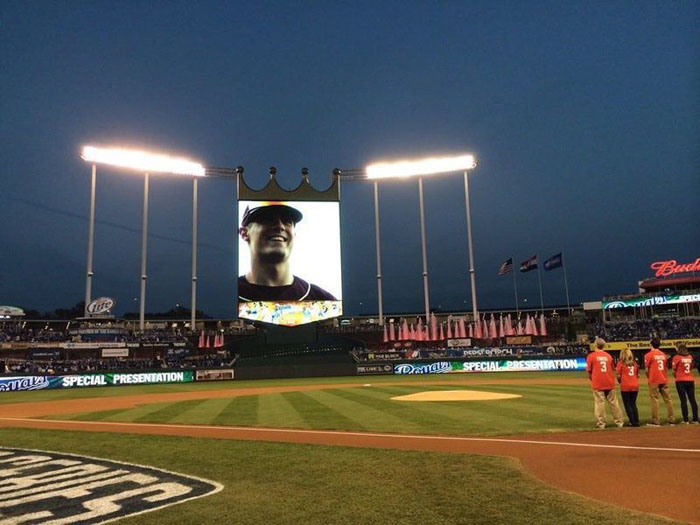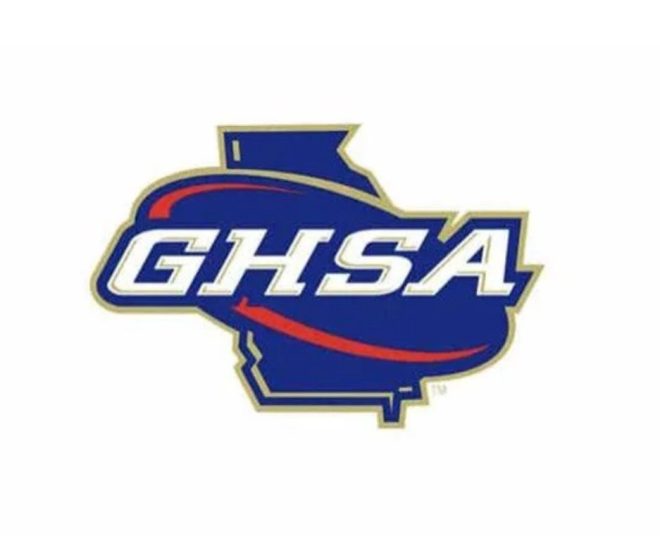Column: MLB Commissioner Manfred dishes on ALS advocate Pete Frates and his enormous impact on baseball
Published 11:30 am Tuesday, June 28, 2016

- With his parents, sister and brother watching from home plate, Pete Frates is honored on the scoreboard at Kauffman Stadium in Kansas City during Game 2 of the World Series. That game was dedicated to ALS awareness by Major League Baseball.
Editor’s note: Phil Stacey, executive sports editor at The Salem, Massachusetts News, had a chance to interview via email Major League Baseball Commissioner Rob Manfred about amyotrophic laterals sclerosis (ALS) patient and advocate Pete Frates, a Massachusetts native. They conversed about Frates’ role and impact on MLB, his courage and determination, and the legacy he shares with one of the game’s all-time greats, Lou Gehrig, as we near the 77th anniversary of Gehrig’s famous “Luckiest man on earth” speech.
ALS is a progressive disease which “attacks nerve cells in the brain and spinal cord that control muscle movement,” according to the ALS Association. It is also known as Lou Gehrig’s Disease and is 100% fatal.
Frates was a Captain of the Boston College baseball team in 2007 and went on to play baseball professionally in Europe. He was diagnosed with ALS in March of 2012, at age 27. Frates is one of the co-founders of the ALS “Ice Bucket Challenge,” a viral fundraising campaign in 2014, which raised over $225 million.
1. Pete Frates’ name has become synonymous worldwide with the movement to Strike Out amyotrophic lateral sclerosis (ALS). Can you talk about Major League Baseball’s role in this?
Baseball has long been associated with ALS because of Lou Gehrig. Our connection to the disease that bears his name is strong, and we have endeavored to draw attention to the need for advancements against ALS. We have coordinated a wide variety of activities to support the fight against this disease. Baseball is at its best when the game can make a difference among its millions of fans, and that is what we have tried to do for ALS families.
2. Can you talk about the first time you met Pete and his family, and what that was like?
Commissioner Emeritus (Bud) Selig met Pete at a Red Sox-Yankees game near the end of the 2014 regular season, during the final weekend of Derek Jeter’s career. Bud invited Pete to be our guest of honor at the World Series. Within a few weeks, I met Pete’s family in Kansas City, where they were our guests at Game 2. MLB dedicated that game to ALS awareness, and although Pete was unable to attend, the entire pregame ceremony revolved around his story and his incredible drive to fight. Our partners at Fox showed a moving video across the country prior to the game. On that night, it was clear to me that the Frateses were an illustration of the strength of all ALS families.
Months later, I had the pleasure of meeting Pete at a function in New York City. My staff and I have stayed in touch with them ever since. I have visited with the Frates family during travels in Boston. I also sent Pete wishes on his birthday last year. They are wonderful people.
3. Major League Baseball has been outstanding in helping to promote ALS awareness. Can you talk about the initiatives, such as the Ice Bucket Challenge, that MLB has done in this regard and the response you’ve gotten from your fans?
Like many organizations, we took part in the ALS Ice Bucket Challenge in 2014. When Pete challenged our office to participate, we accepted. It was also memorable for me because we accepted the Challenge shortly after I was elected commissioner, and the Challenge was my first organization-wide activity. When the Frates family and the ALS Association asked us to participate again last year, we again supported. Throughout each day of August last year, all of our clubs and umpires took turns in doing the Ice Bucket Challenge again. Most importantly of all, MLB donated $100,000 to the ALS Association in 2015.
4. Clearly, Major League Baseball has had a longstanding association with ALS since Lou Gehrig was diagnosed in 1939. Can you talk about this?
Lou Gehrig is one of the greatest and most important figures our game has ever known. The work that we continue to do in this area is largely in his memory. When you stop and consider that we still do not have a cure in 2016 — 77 years after his words on July 4, 1939 — it is a stark reminder of how far we have to go. Baseball is committed to doing its part.
5. The upcoming Fourth of July holiday is important in the fight against ALS, too, considering that’s when Lou Gehrig delivered his famous “Luckiest man on earth” speech in 1939.
The Fourth of July has been a centerpiece of our efforts. A notable example of keeping his memory alive was in 2014. To mark the 75th anniversary of the speech, we had the first basemen of all of our clubs recite his words, and the rendition ended with another Yankee captain, Derek Jeter.
6. Do you feel that Pete Frates helps connect a new generation of baseball fans to the ALS cause — and pay forward the awareness that Lou Gehrig began?
I do. Stories like those of Pete Frates and his friend Pat Quinn clearly have resonated deeply with people, particularly those of their generation. They have shown unbelievable courage and determination. Awareness and fundraising are inextricably linked. Pete and his family are such effective ambassadors and communicators about the challenges to overcome and the goals to meet.
7. What kind of feedback do you get from others in the game — players, coaches, executives — in regards to Pete?
Our game has been united in taking on this initiative and educating fans about this disease. All of our clubs have contributed in recent seasons. The clubs do spectacular work in the community, but our efforts in this particular space have been especially meaningful.
8. Do you feel as though this issue hits home for many of the players, seeing as how Pete was just like them — a terrific young ballplayer — growing up?
I do feel that our players have a special bond with Pete. I often say that baseball players learn perseverance and teamwork from the game, and they can apply those values to much more important contexts in life. Pete has done exactly that on an issue that demands our attention. We are very grateful for his leadership and enthusiasm to change the face of this disease.
9. Can you talk about the tireless work done by the Boston Red Sox with Pete, from signing him to a contract to having him involved in events such as Opening Day and Derek Jeter’s final major league game?
The Red Sox are an integral part of New England, and their support of Pete and his family has been nothing short of extraordinary. It’s been a long-term relationship, and the Red Sox have consistently demonstrated a commitment to awareness.
10. Does Major League Baseball have any new enterprises coming up in its quest to help bring awareness to, and help in the fight against, ALS?
We continue to have conversations with the ALS Association, and we are hopeful to find some creative new avenues to pursue. Social media gives us great tools that allow us to reach fans and educate them, and I think that is one important part of the solution.
11. Finally, in your own words, tell us what Pete Frates means to you, to Major League Baseball, and fans throughout this country and beyond.
Jackie Robinson once said, “A life is not important except in the impact it has on other lives.” Pete has had a major impact on this fight, and he’s always made his chosen sport proud. We are honored to call him a member of the baseball family.
Stacey is the executive sports editor at The Salem, Massachusetts News.





